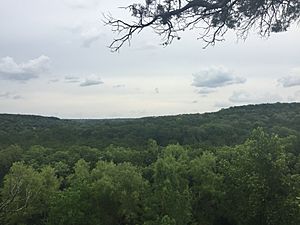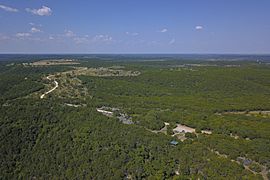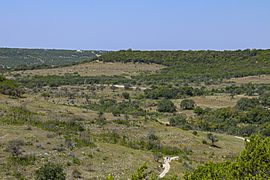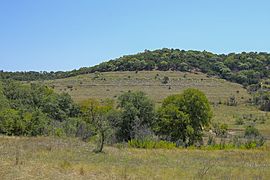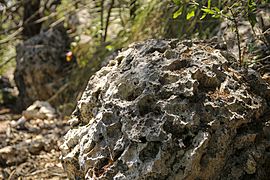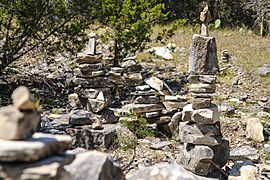Balcones Canyonlands National Wildlife Refuge facts for kids
Quick facts for kids Balcones Canyonlands |
|
|---|---|
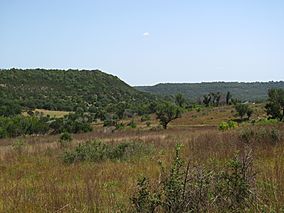
Balcones Canyonlands National Wildlife Refuge
|
|
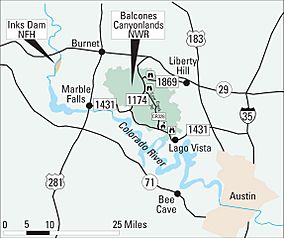
Map of refuge
|
|
| Location | Austin, Texas, Texas Hill Country, Texas, United States |
| Area | 186 km2 (72 sq mi) |
| Established | 1992 |
| Operator | United States Fish and Wildlife Service |
| Website | Balcones Canyonlands National Wildlife Refuge |
The Balcones Canyonlands is a special place in the Texas Hill Country, located northwest of Austin, Texas. It is a National Wildlife Refuge, which means it's a protected area for animals and plants. This refuge was created in 1992.
Its main goal is to protect the homes of two rare songbirds: the golden-cheeked warbler and the black-capped vireo. It also helps keep the natural Texas Hill Country safe for many other types of wildlife. There's another similar protected area nearby called the Balcones Canyonlands Preserve.
What is the Balcones Canyonlands?
The Balcones Canyonlands National Wildlife Refuge covers about 186 square kilometers (72 square miles). It is part of the Edwards Plateau, a high, flat area of land. This part of the plateau has many deep canyons and streams with steep sides. These canyons were carved into the limestone rock by small rivers that flow into the Colorado River.
Underground Wonders
Below the ground in the Edwards Plateau, there's a hidden world. It's like a maze of caves, holes called sinkholes, and natural springs. Many unique creatures live here, like special spiders and beetles. You won't find these animals anywhere else in Texas!
Even deeper underground is the Edwards Aquifer. This is a huge natural storage area for water. It holds billions of gallons of water. This water provides drinking water for almost one million people. The aquifer also feeds many springs that flow into the Hill Country rivers. These rivers eventually reach the marshes, estuaries, and bays along the Texas Gulf Coast.
Plants and Animals
The Hill Country is home to many different kinds of trees. You'll find various types of oaks, elms, and Ashe juniper trees. People in Texas often call Ashe junipers "cedars."
The two endangered birds, the golden-cheeked warbler and the black-capped vireo, depend on these trees. They need different stages of plant growth to build their nests and find food. Both of these birds nest in the Edwards Plateau. The golden-cheeked warbler nests only in this area.
Gallery
 | Valerie Thomas |
 | Frederick McKinley Jones |
 | George Edward Alcorn Jr. |
 | Thomas Mensah |


